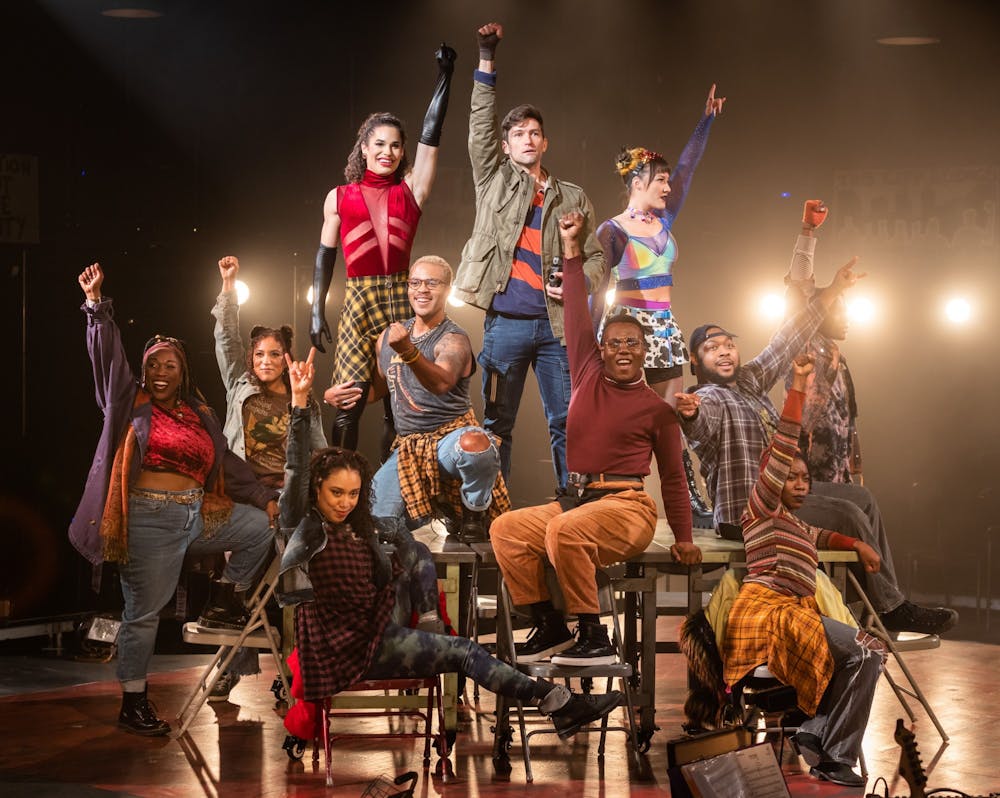Chances are, if you’ve seen one production of the rock musical “Rent,” written by the late Jonathan Larson, you’ve seen them all. Aside from rotating in a fresh cast of actors, the musical does not lend itself well to reinvention or reinterpretation. But Signature Theatre’s in-the-round revival sings new life into the classic musical and reminds audiences why “Rent” is as relevant as ever.
“Rent” is set in the 1990s in the Lower East Side of New York City, where the AIDS epidemic begins to shake the neighborhood and a housing crisis leaves many New Yorkers without a home or way to pay the bills. The plot follows a group of marginalized young artists as they struggle during tumultuous times.
At Signature Theatre, director Matthew Gardiner brilliantly stages his production in the round, plunging the audience directly into the action of the play. A smoky haze fills the theater and low hanging lights illuminate the worn-down playing area, creating a feeling of grunge that swathed the city at the time.
The musical opens with roommates Mark and Roger sitting in their loft apartment on Christmas Eve. Mark, played with bristling energy by Jake Loewenthal, is a budding documentary filmmaker; while the brooding Roger, played by the velvet-voiced Vincent Kempski, is a songwriter grappling with the recent suicide of his girlfriend and a newly diagnosed HIV-positive status. As Mark begins to roll his camera, an ensemble of actors come to the stage, bringing to life an eclectic New York City in rebellion.
Something that Gardiner understands about “Rent” is that it is ultimately a story about community. As characters weave in-and-out of focus, an overall picture emerges depicting how humanity is at its strongest when working together toward a common goal. This message could not arrive at a more opportune time for audiences today.
However, the common goal for the characters in “Rent” is to revolt against the landlords who are demanding money from people barely managing to stay alive, let alone keep the lights on. And this group of friends is not without their divisions, either.
Roger has fallen for Mimi, the dancer who lives next door. But Mimi, slyly portrayed by Arianna Rosario, uses heroin to cope with her HIV-positive status, something that Roger does not approve of. In “Light my Candle,” the two playfully come together in a flirtatious, vocal pas de deux, but neither is willing to admit their status, shrouding their blooming romance in secrecy.
Meanwhile, Mark manages to involve himself in the relationship of his ex-girlfriend Maureen, played by a dexterous Katie Mariko Murray, and her new girlfriend Joanne, played with defiance by Ines Nassara. The two women are passionately in love, but are also constantly at each other's throats over jealousy and pride.
Then there’s Collins, played by an endlessly charming Josh A. Dawson. Collins is an old friend of Mark and Rogers, who meets an angel, both literally and figuratively, after being mugged on the wintery streets of the Lower East Side. As played by an iridescent David Merino, Angel is a source of light throughout this entire production. Merino’s megawatt smile shines so brightly it challenges the spotlights and Merino dances the part with an energy that electrifies.
Angel is a character ahead of their time, who defies any structural confines of gender or sexuality. Collins and Angel fall for each other immediately and both disclose their HIV-positive statuses up-front, which builds their relationship on a foundation of honesty and trust. Angel’s unwavering optimism about the world buoys them despite the disease they share, until it doesn't.
In the first act finale, “La Vie Boheme,” the characters tear across the stage and over set pieces singing about the art and artists that keep them alive. At Signature Theatre, this number rings especially true as a cast of wildly talented young actors so obviously relishes the opportunity to play once again on a stage after a year and half of theaters being closed across America.
However, it is the second act of “Rent” that echoes across decades to a modern audience. As HIV progresses into AIDS and certain characters become more ill, the group of friends realize how death and disease can simultaneously tear people apart and bring them together.
In “Seasons of Love,” inarguably the show’s most famous musical number, the characters find unity in singing about the blessing of love in trying times. This love reverberates throughout Signature Theatre, offering comfort to an audience that is emerging from its very own rubble.
After facing friction with each other throughout the course of the show, the characters ultimately unite one last time during the finale. They sing out repeatedly that there is “no day but today.” Their message pours over the audience in waves. If there is one thing the characters in “Rent” come to understand, it’s that there is nothing more powerful than the present, and the chance to create and love again.





